Law, Policy & Ethical Practice in HSC: HND Healthcare Practice Report
VerifiedAdded on 2023/01/10
|8
|1806
|51
Report
AI Summary
This report examines the legal, ethical, and policy frameworks governing health and social care practice in the UK. It explores the roles of the judiciary, legislature, and executive branches, including the concept of separation of powers, and analyzes the impact of devolution on healthcare systems within the UK. The report discusses the impact of the judiciary on healthcare, including its involvement in policy areas such as insurance coverage and hospital mergers. It also explains key legal concepts like vicarious liability and negligence, and outlines the roles of legislation, statutory guidance, and codes of practice. The report delves into political aspects affecting the legal framework, highlighting challenges faced by hospitals and community services. It further examines the Equality Act 2010, the process by which a bill becomes law, and the structure of the Department of Health and Social Care. Finally, the report emphasizes ethical considerations, including patient confidentiality and informed practice, and how these considerations inform the legal and political landscape for healthcare practitioners. It references relevant acts, regulations and guidance to support the discussion.
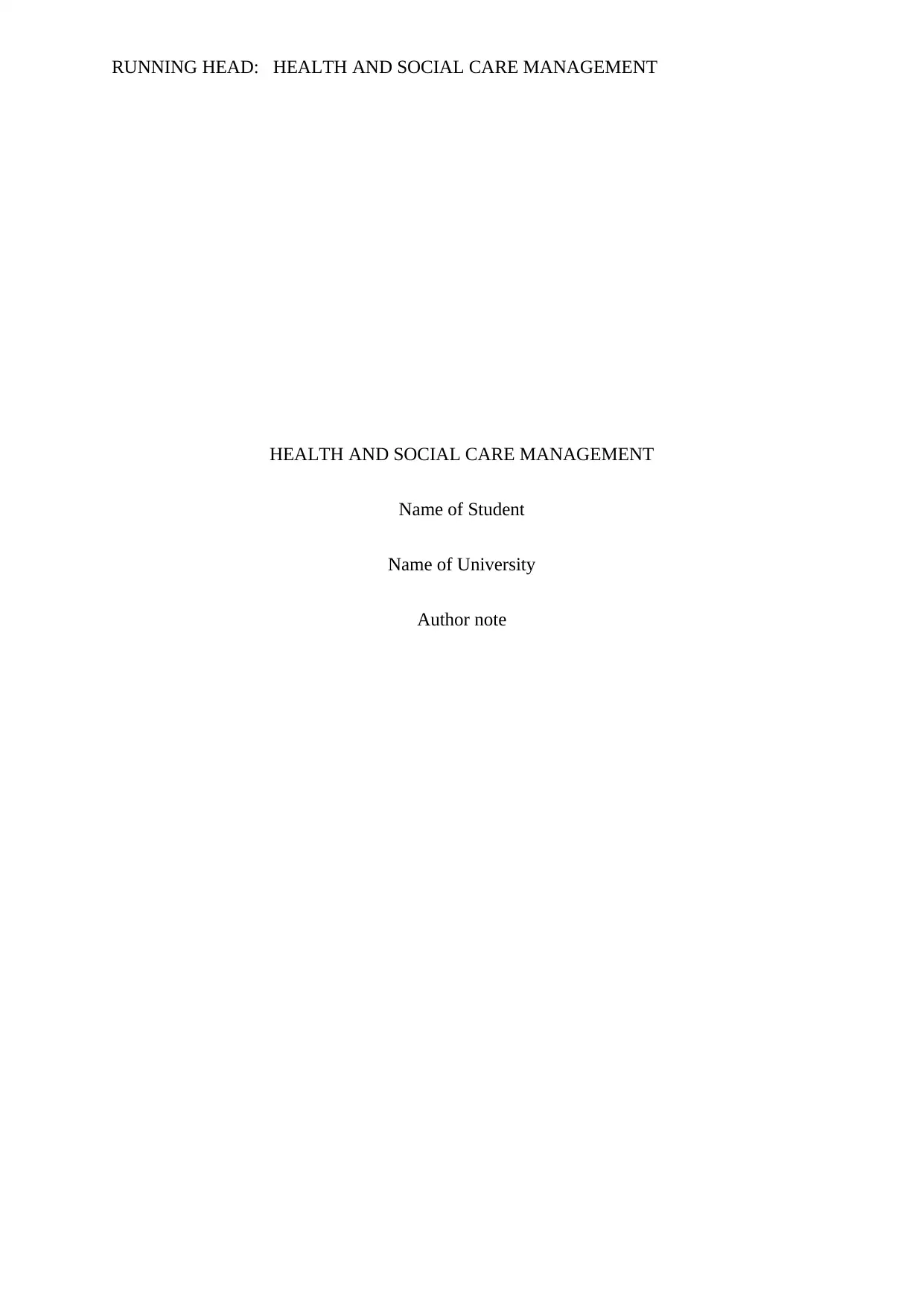
RUNNING HEAD: HEALTH AND SOCIAL CARE MANAGEMENT
HEALTH AND SOCIAL CARE MANAGEMENT
Name of Student
Name of University
Author note
HEALTH AND SOCIAL CARE MANAGEMENT
Name of Student
Name of University
Author note
Paraphrase This Document
Need a fresh take? Get an instant paraphrase of this document with our AI Paraphraser
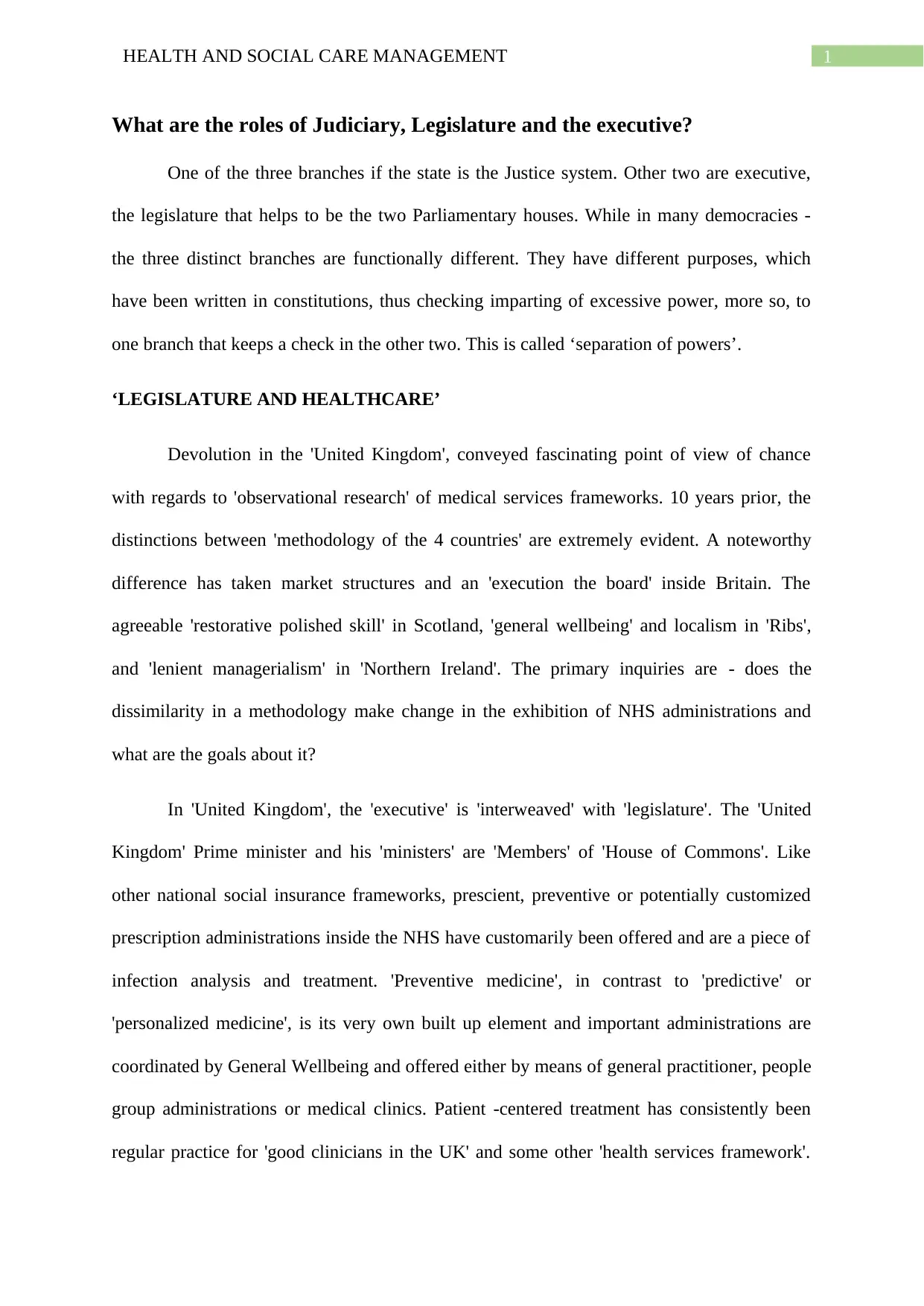
1HEALTH AND SOCIAL CARE MANAGEMENT
What are the roles of Judiciary, Legislature and the executive?
One of the three branches if the state is the Justice system. Other two are executive,
the legislature that helps to be the two Parliamentary houses. While in many democracies -
the three distinct branches are functionally different. They have different purposes, which
have been written in constitutions, thus checking imparting of excessive power, more so, to
one branch that keeps a check in the other two. This is called ‘separation of powers’.
‘LEGISLATURE AND HEALTHCARE’
Devolution in the 'United Kingdom', conveyed fascinating point of view of chance
with regards to 'observational research' of medical services frameworks. 10 years prior, the
distinctions between 'methodology of the 4 countries' are extremely evident. A noteworthy
difference has taken market structures and an 'execution the board' inside Britain. The
agreeable 'restorative polished skill' in Scotland, 'general wellbeing' and localism in 'Ribs',
and 'lenient managerialism' in 'Northern Ireland'. The primary inquiries are - does the
dissimilarity in a methodology make change in the exhibition of NHS administrations and
what are the goals about it?
In 'United Kingdom', the 'executive' is 'interweaved' with 'legislature'. The 'United
Kingdom' Prime minister and his 'ministers' are 'Members' of 'House of Commons'. Like
other national social insurance frameworks, prescient, preventive or potentially customized
prescription administrations inside the NHS have customarily been offered and are a piece of
infection analysis and treatment. 'Preventive medicine', in contrast to 'predictive' or
'personalized medicine', is its very own built up element and important administrations are
coordinated by General Wellbeing and offered either by means of general practitioner, people
group administrations or medical clinics. Patient -centered treatment has consistently been
regular practice for 'good clinicians in the UK' and some other 'health services framework'.
What are the roles of Judiciary, Legislature and the executive?
One of the three branches if the state is the Justice system. Other two are executive,
the legislature that helps to be the two Parliamentary houses. While in many democracies -
the three distinct branches are functionally different. They have different purposes, which
have been written in constitutions, thus checking imparting of excessive power, more so, to
one branch that keeps a check in the other two. This is called ‘separation of powers’.
‘LEGISLATURE AND HEALTHCARE’
Devolution in the 'United Kingdom', conveyed fascinating point of view of chance
with regards to 'observational research' of medical services frameworks. 10 years prior, the
distinctions between 'methodology of the 4 countries' are extremely evident. A noteworthy
difference has taken market structures and an 'execution the board' inside Britain. The
agreeable 'restorative polished skill' in Scotland, 'general wellbeing' and localism in 'Ribs',
and 'lenient managerialism' in 'Northern Ireland'. The primary inquiries are - does the
dissimilarity in a methodology make change in the exhibition of NHS administrations and
what are the goals about it?
In 'United Kingdom', the 'executive' is 'interweaved' with 'legislature'. The 'United
Kingdom' Prime minister and his 'ministers' are 'Members' of 'House of Commons'. Like
other national social insurance frameworks, prescient, preventive or potentially customized
prescription administrations inside the NHS have customarily been offered and are a piece of
infection analysis and treatment. 'Preventive medicine', in contrast to 'predictive' or
'personalized medicine', is its very own built up element and important administrations are
coordinated by General Wellbeing and offered either by means of general practitioner, people
group administrations or medical clinics. Patient -centered treatment has consistently been
regular practice for 'good clinicians in the UK' and some other 'health services framework'.
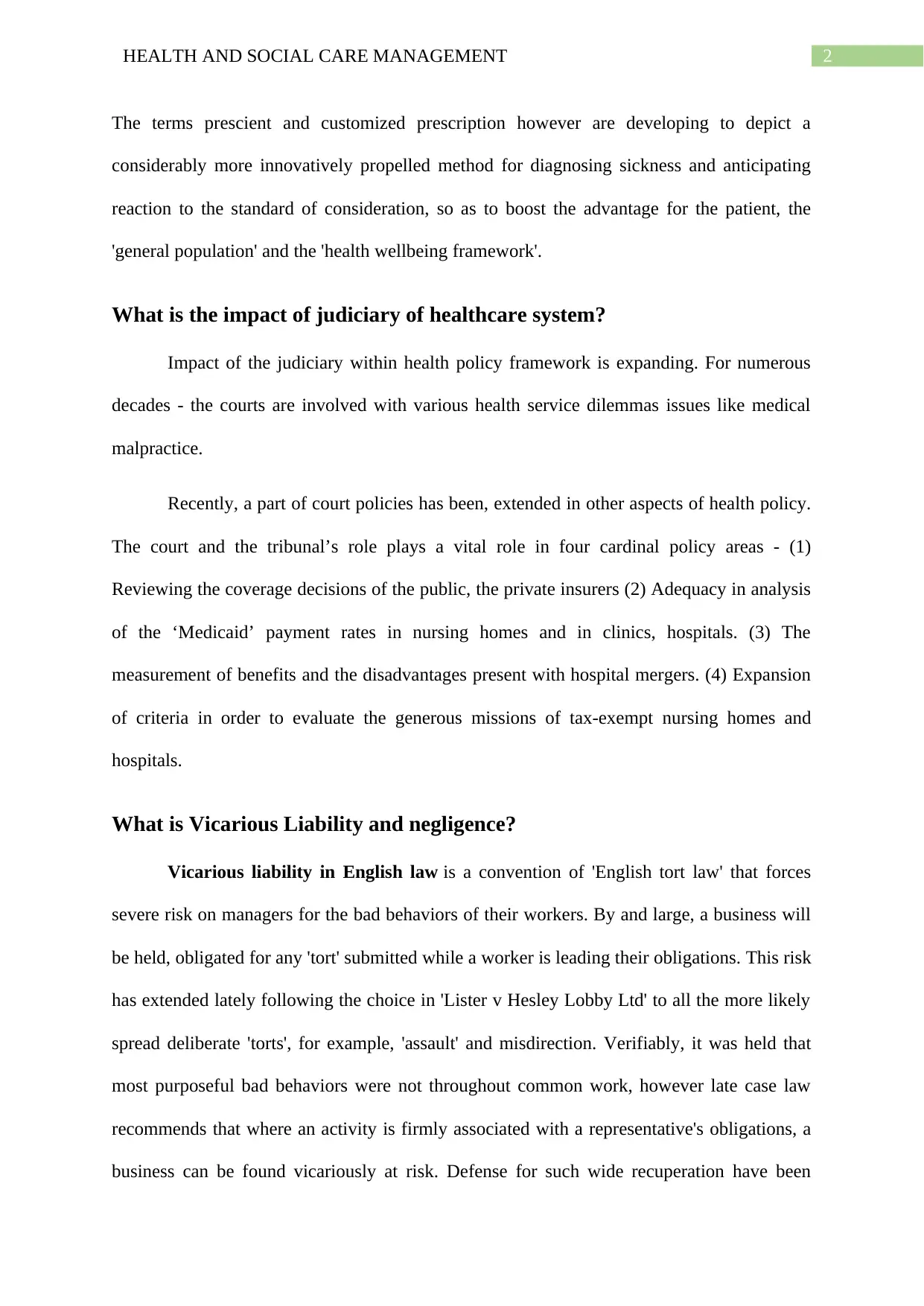
2HEALTH AND SOCIAL CARE MANAGEMENT
The terms prescient and customized prescription however are developing to depict a
considerably more innovatively propelled method for diagnosing sickness and anticipating
reaction to the standard of consideration, so as to boost the advantage for the patient, the
'general population' and the 'health wellbeing framework'.
What is the impact of judiciary of healthcare system?
Impact of the judiciary within health policy framework is expanding. For numerous
decades - the courts are involved with various health service dilemmas issues like medical
malpractice.
Recently, a part of court policies has been, extended in other aspects of health policy.
The court and the tribunal’s role plays a vital role in four cardinal policy areas - (1)
Reviewing the coverage decisions of the public, the private insurers (2) Adequacy in analysis
of the ‘Medicaid’ payment rates in nursing homes and in clinics, hospitals. (3) The
measurement of benefits and the disadvantages present with hospital mergers. (4) Expansion
of criteria in order to evaluate the generous missions of tax-exempt nursing homes and
hospitals.
What is Vicarious Liability and negligence?
Vicarious liability in English law is a convention of 'English tort law' that forces
severe risk on managers for the bad behaviors of their workers. By and large, a business will
be held, obligated for any 'tort' submitted while a worker is leading their obligations. This risk
has extended lately following the choice in 'Lister v Hesley Lobby Ltd' to all the more likely
spread deliberate 'torts', for example, 'assault' and misdirection. Verifiably, it was held that
most purposeful bad behaviors were not throughout common work, however late case law
recommends that where an activity is firmly associated with a representative's obligations, a
business can be found vicariously at risk. Defense for such wide recuperation have been
The terms prescient and customized prescription however are developing to depict a
considerably more innovatively propelled method for diagnosing sickness and anticipating
reaction to the standard of consideration, so as to boost the advantage for the patient, the
'general population' and the 'health wellbeing framework'.
What is the impact of judiciary of healthcare system?
Impact of the judiciary within health policy framework is expanding. For numerous
decades - the courts are involved with various health service dilemmas issues like medical
malpractice.
Recently, a part of court policies has been, extended in other aspects of health policy.
The court and the tribunal’s role plays a vital role in four cardinal policy areas - (1)
Reviewing the coverage decisions of the public, the private insurers (2) Adequacy in analysis
of the ‘Medicaid’ payment rates in nursing homes and in clinics, hospitals. (3) The
measurement of benefits and the disadvantages present with hospital mergers. (4) Expansion
of criteria in order to evaluate the generous missions of tax-exempt nursing homes and
hospitals.
What is Vicarious Liability and negligence?
Vicarious liability in English law is a convention of 'English tort law' that forces
severe risk on managers for the bad behaviors of their workers. By and large, a business will
be held, obligated for any 'tort' submitted while a worker is leading their obligations. This risk
has extended lately following the choice in 'Lister v Hesley Lobby Ltd' to all the more likely
spread deliberate 'torts', for example, 'assault' and misdirection. Verifiably, it was held that
most purposeful bad behaviors were not throughout common work, however late case law
recommends that where an activity is firmly associated with a representative's obligations, a
business can be found vicariously at risk. Defense for such wide recuperation have been
⊘ This is a preview!⊘
Do you want full access?
Subscribe today to unlock all pages.

Trusted by 1+ million students worldwide
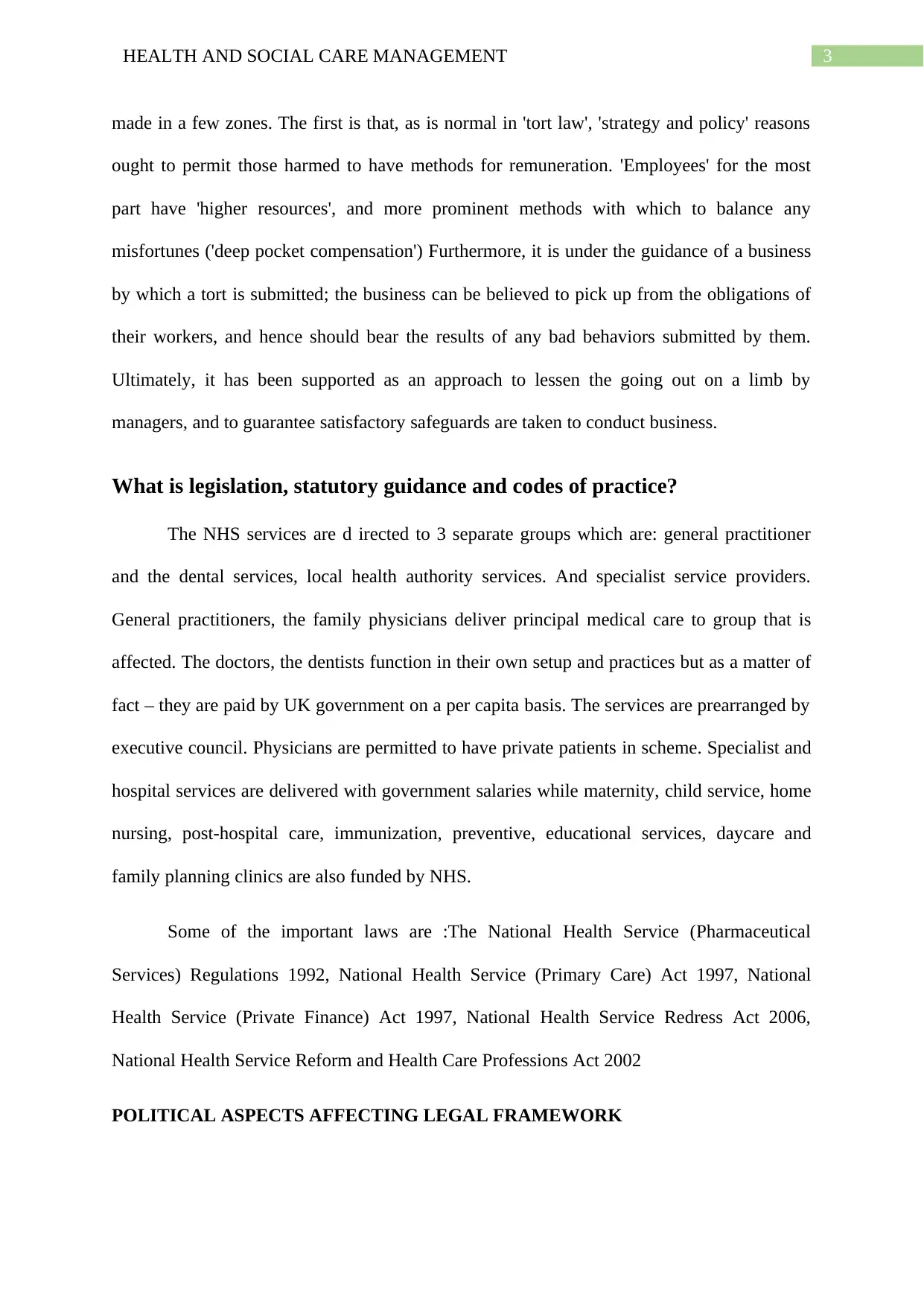
3HEALTH AND SOCIAL CARE MANAGEMENT
made in a few zones. The first is that, as is normal in 'tort law', 'strategy and policy' reasons
ought to permit those harmed to have methods for remuneration. 'Employees' for the most
part have 'higher resources', and more prominent methods with which to balance any
misfortunes ('deep pocket compensation') Furthermore, it is under the guidance of a business
by which a tort is submitted; the business can be believed to pick up from the obligations of
their workers, and hence should bear the results of any bad behaviors submitted by them.
Ultimately, it has been supported as an approach to lessen the going out on a limb by
managers, and to guarantee satisfactory safeguards are taken to conduct business.
What is legislation, statutory guidance and codes of practice?
The NHS services are d irected to 3 separate groups which are: general practitioner
and the dental services, local health authority services. And specialist service providers.
General practitioners, the family physicians deliver principal medical care to group that is
affected. The doctors, the dentists function in their own setup and practices but as a matter of
fact – they are paid by UK government on a per capita basis. The services are prearranged by
executive council. Physicians are permitted to have private patients in scheme. Specialist and
hospital services are delivered with government salaries while maternity, child service, home
nursing, post-hospital care, immunization, preventive, educational services, daycare and
family planning clinics are also funded by NHS.
Some of the important laws are :The National Health Service (Pharmaceutical
Services) Regulations 1992, National Health Service (Primary Care) Act 1997, National
Health Service (Private Finance) Act 1997, National Health Service Redress Act 2006,
National Health Service Reform and Health Care Professions Act 2002
POLITICAL ASPECTS AFFECTING LEGAL FRAMEWORK
made in a few zones. The first is that, as is normal in 'tort law', 'strategy and policy' reasons
ought to permit those harmed to have methods for remuneration. 'Employees' for the most
part have 'higher resources', and more prominent methods with which to balance any
misfortunes ('deep pocket compensation') Furthermore, it is under the guidance of a business
by which a tort is submitted; the business can be believed to pick up from the obligations of
their workers, and hence should bear the results of any bad behaviors submitted by them.
Ultimately, it has been supported as an approach to lessen the going out on a limb by
managers, and to guarantee satisfactory safeguards are taken to conduct business.
What is legislation, statutory guidance and codes of practice?
The NHS services are d irected to 3 separate groups which are: general practitioner
and the dental services, local health authority services. And specialist service providers.
General practitioners, the family physicians deliver principal medical care to group that is
affected. The doctors, the dentists function in their own setup and practices but as a matter of
fact – they are paid by UK government on a per capita basis. The services are prearranged by
executive council. Physicians are permitted to have private patients in scheme. Specialist and
hospital services are delivered with government salaries while maternity, child service, home
nursing, post-hospital care, immunization, preventive, educational services, daycare and
family planning clinics are also funded by NHS.
Some of the important laws are :The National Health Service (Pharmaceutical
Services) Regulations 1992, National Health Service (Primary Care) Act 1997, National
Health Service (Private Finance) Act 1997, National Health Service Redress Act 2006,
National Health Service Reform and Health Care Professions Act 2002
POLITICAL ASPECTS AFFECTING LEGAL FRAMEWORK
Paraphrase This Document
Need a fresh take? Get an instant paraphrase of this document with our AI Paraphraser
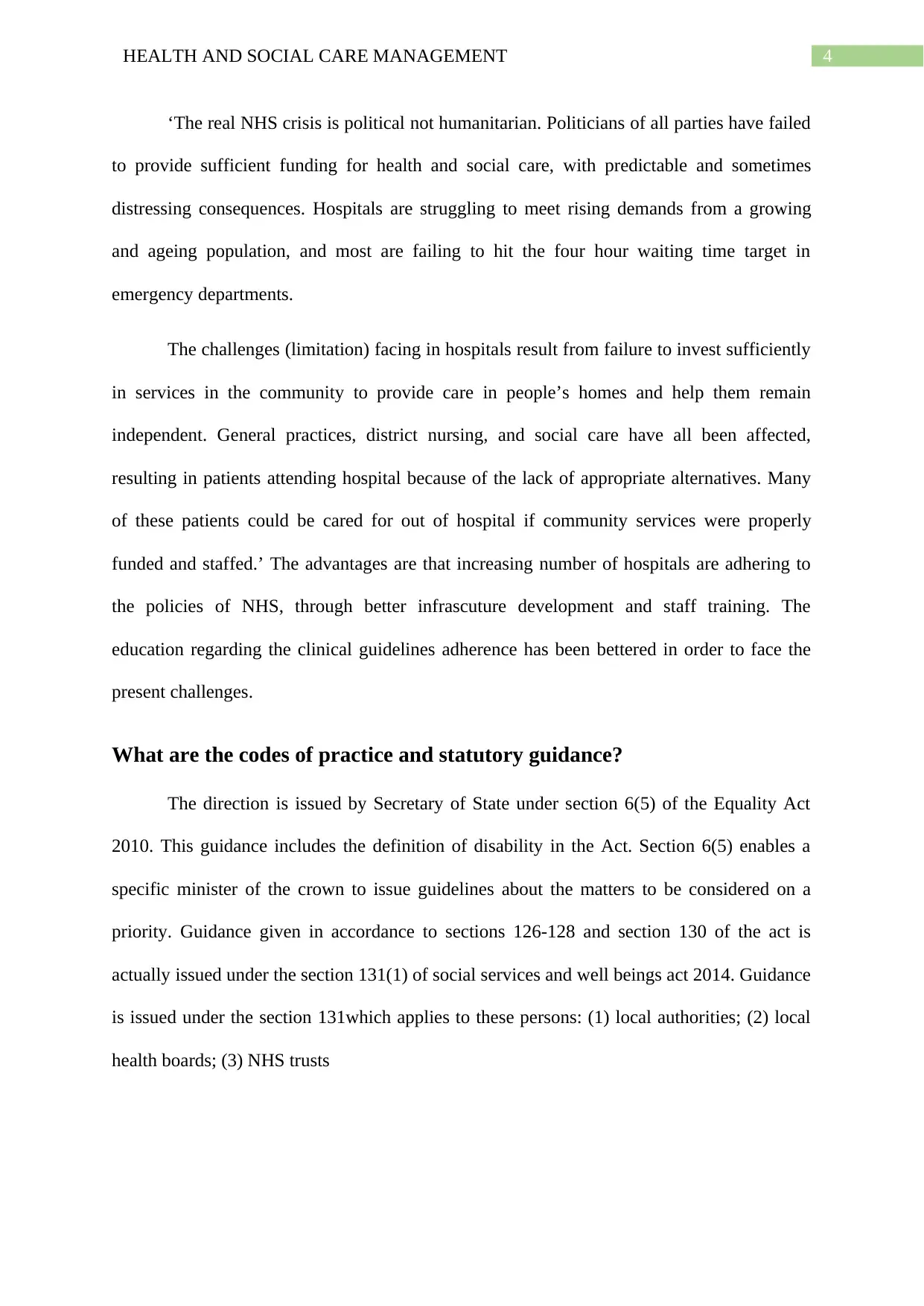
4HEALTH AND SOCIAL CARE MANAGEMENT
‘The real NHS crisis is political not humanitarian. Politicians of all parties have failed
to provide sufficient funding for health and social care, with predictable and sometimes
distressing consequences. Hospitals are struggling to meet rising demands from a growing
and ageing population, and most are failing to hit the four hour waiting time target in
emergency departments.
The challenges (limitation) facing in hospitals result from failure to invest sufficiently
in services in the community to provide care in people’s homes and help them remain
independent. General practices, district nursing, and social care have all been affected,
resulting in patients attending hospital because of the lack of appropriate alternatives. Many
of these patients could be cared for out of hospital if community services were properly
funded and staffed.’ The advantages are that increasing number of hospitals are adhering to
the policies of NHS, through better infrascuture development and staff training. The
education regarding the clinical guidelines adherence has been bettered in order to face the
present challenges.
What are the codes of practice and statutory guidance?
The direction is issued by Secretary of State under section 6(5) of the Equality Act
2010. This guidance includes the definition of disability in the Act. Section 6(5) enables a
specific minister of the crown to issue guidelines about the matters to be considered on a
priority. Guidance given in accordance to sections 126-128 and section 130 of the act is
actually issued under the section 131(1) of social services and well beings act 2014. Guidance
is issued under the section 131which applies to these persons: (1) local authorities; (2) local
health boards; (3) NHS trusts
‘The real NHS crisis is political not humanitarian. Politicians of all parties have failed
to provide sufficient funding for health and social care, with predictable and sometimes
distressing consequences. Hospitals are struggling to meet rising demands from a growing
and ageing population, and most are failing to hit the four hour waiting time target in
emergency departments.
The challenges (limitation) facing in hospitals result from failure to invest sufficiently
in services in the community to provide care in people’s homes and help them remain
independent. General practices, district nursing, and social care have all been affected,
resulting in patients attending hospital because of the lack of appropriate alternatives. Many
of these patients could be cared for out of hospital if community services were properly
funded and staffed.’ The advantages are that increasing number of hospitals are adhering to
the policies of NHS, through better infrascuture development and staff training. The
education regarding the clinical guidelines adherence has been bettered in order to face the
present challenges.
What are the codes of practice and statutory guidance?
The direction is issued by Secretary of State under section 6(5) of the Equality Act
2010. This guidance includes the definition of disability in the Act. Section 6(5) enables a
specific minister of the crown to issue guidelines about the matters to be considered on a
priority. Guidance given in accordance to sections 126-128 and section 130 of the act is
actually issued under the section 131(1) of social services and well beings act 2014. Guidance
is issued under the section 131which applies to these persons: (1) local authorities; (2) local
health boards; (3) NHS trusts
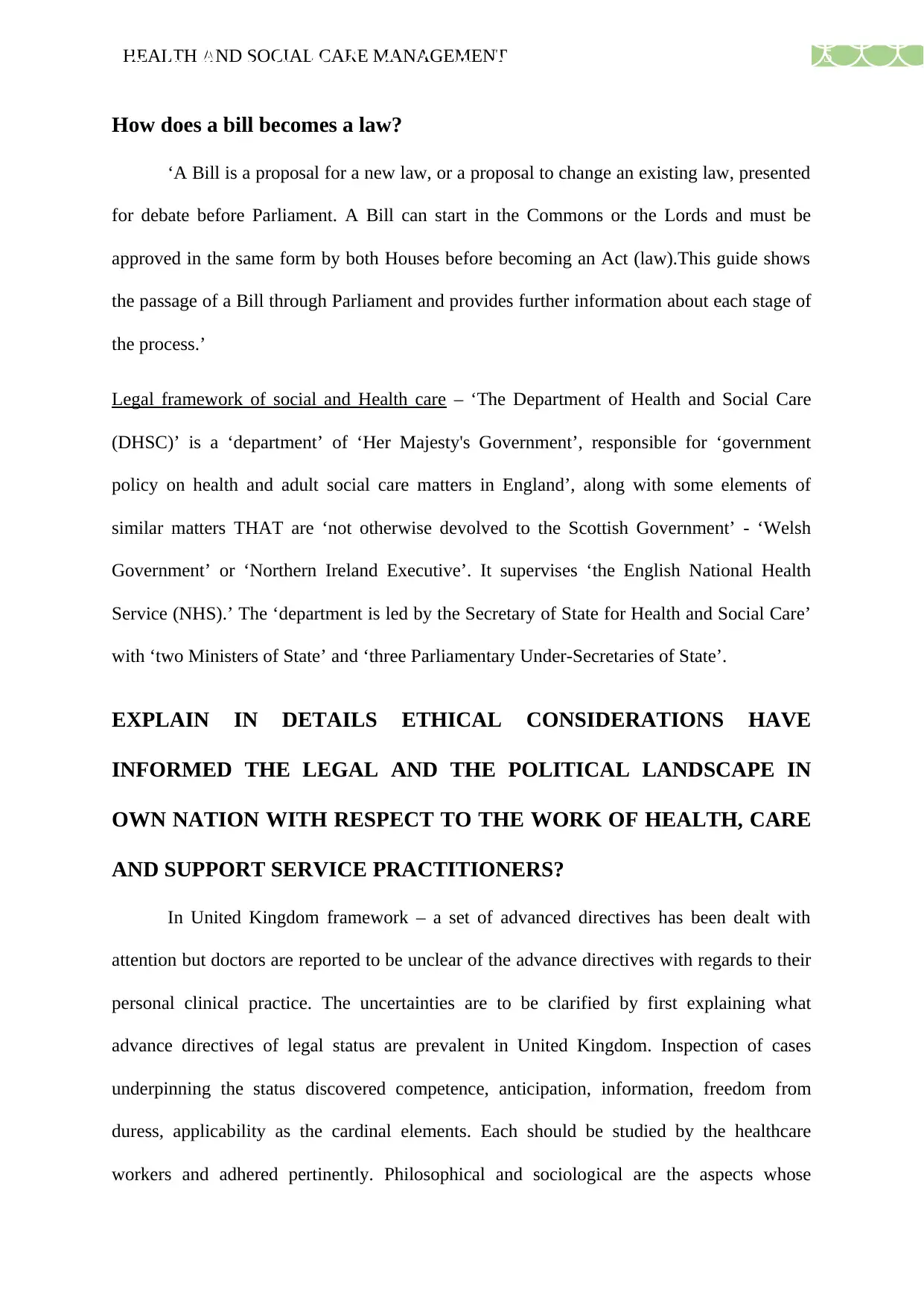
5HEALTH AND SOCIAL CARE MANAGEMENT
How does a bill becomes a law?
‘A Bill is a proposal for a new law, or a proposal to change an existing law, presented
for debate before Parliament. A Bill can start in the Commons or the Lords and must be
approved in the same form by both Houses before becoming an Act (law).This guide shows
the passage of a Bill through Parliament and provides further information about each stage of
the process.’
Legal framework of social and Health care – ‘The Department of Health and Social Care
(DHSC)’ is a ‘department’ of ‘Her Majesty's Government’, responsible for ‘government
policy on health and adult social care matters in England’, along with some elements of
similar matters THAT are ‘not otherwise devolved to the Scottish Government’ - ‘Welsh
Government’ or ‘Northern Ireland Executive’. It supervises ‘the English National Health
Service (NHS).’ The ‘department is led by the Secretary of State for Health and Social Care’
with ‘two Ministers of State’ and ‘three Parliamentary Under-Secretaries of State’.
EXPLAIN IN DETAILS ETHICAL CONSIDERATIONS HAVE
INFORMED THE LEGAL AND THE POLITICAL LANDSCAPE IN
OWN NATION WITH RESPECT TO THE WORK OF HEALTH, CARE
AND SUPPORT SERVICE PRACTITIONERS?
In United Kingdom framework – a set of advanced directives has been dealt with
attention but doctors are reported to be unclear of the advance directives with regards to their
personal clinical practice. The uncertainties are to be clarified by first explaining what
advance directives of legal status are prevalent in United Kingdom. Inspection of cases
underpinning the status discovered competence, anticipation, information, freedom from
duress, applicability as the cardinal elements. Each should be studied by the healthcare
workers and adhered pertinently. Philosophical and sociological are the aspects whose
How does a bill becomes a law?
‘A Bill is a proposal for a new law, or a proposal to change an existing law, presented
for debate before Parliament. A Bill can start in the Commons or the Lords and must be
approved in the same form by both Houses before becoming an Act (law).This guide shows
the passage of a Bill through Parliament and provides further information about each stage of
the process.’
Legal framework of social and Health care – ‘The Department of Health and Social Care
(DHSC)’ is a ‘department’ of ‘Her Majesty's Government’, responsible for ‘government
policy on health and adult social care matters in England’, along with some elements of
similar matters THAT are ‘not otherwise devolved to the Scottish Government’ - ‘Welsh
Government’ or ‘Northern Ireland Executive’. It supervises ‘the English National Health
Service (NHS).’ The ‘department is led by the Secretary of State for Health and Social Care’
with ‘two Ministers of State’ and ‘three Parliamentary Under-Secretaries of State’.
EXPLAIN IN DETAILS ETHICAL CONSIDERATIONS HAVE
INFORMED THE LEGAL AND THE POLITICAL LANDSCAPE IN
OWN NATION WITH RESPECT TO THE WORK OF HEALTH, CARE
AND SUPPORT SERVICE PRACTITIONERS?
In United Kingdom framework – a set of advanced directives has been dealt with
attention but doctors are reported to be unclear of the advance directives with regards to their
personal clinical practice. The uncertainties are to be clarified by first explaining what
advance directives of legal status are prevalent in United Kingdom. Inspection of cases
underpinning the status discovered competence, anticipation, information, freedom from
duress, applicability as the cardinal elements. Each should be studied by the healthcare
workers and adhered pertinently. Philosophical and sociological are the aspects whose
⊘ This is a preview!⊘
Do you want full access?
Subscribe today to unlock all pages.

Trusted by 1+ million students worldwide
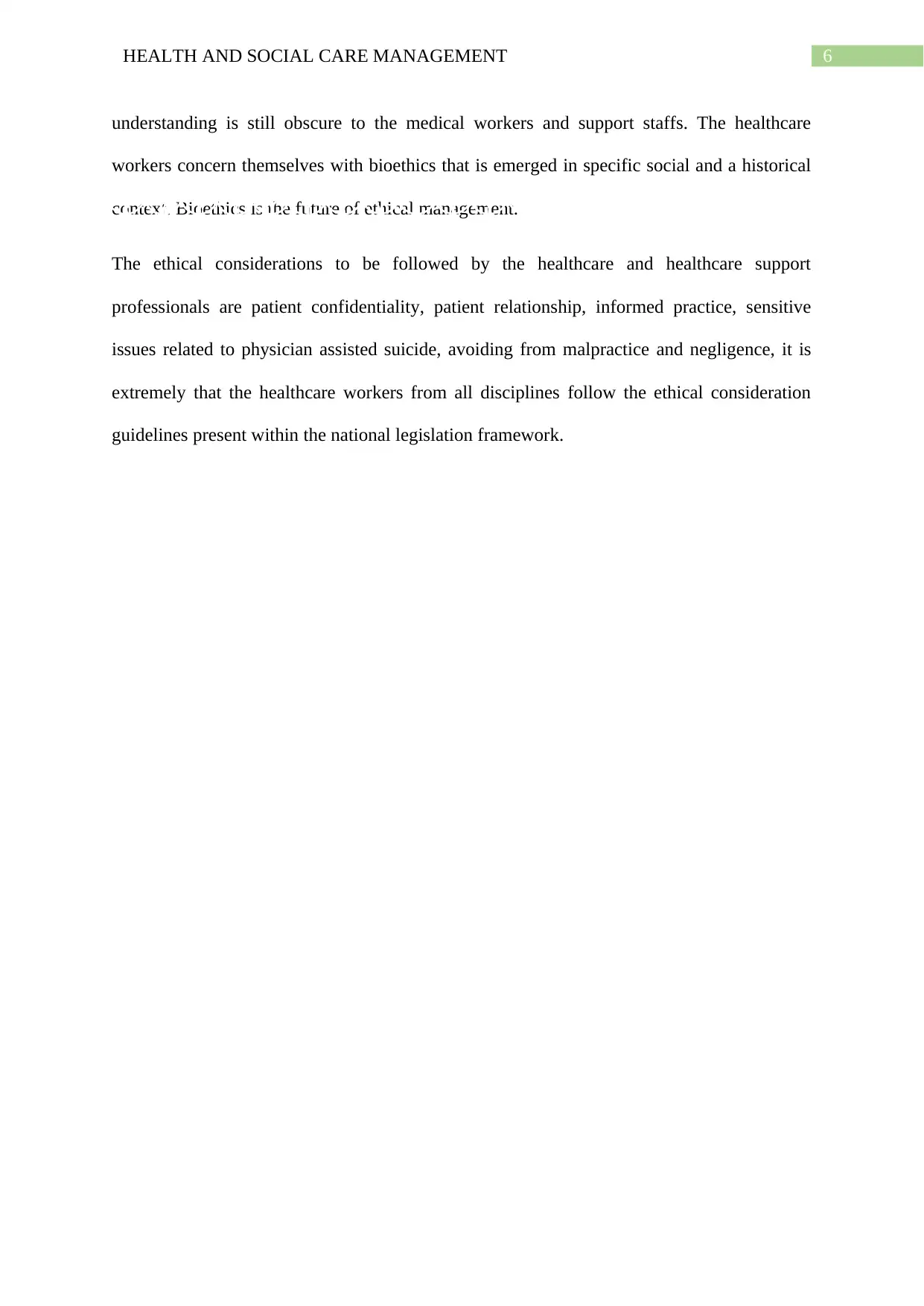
6HEALTH AND SOCIAL CARE MANAGEMENT
understanding is still obscure to the medical workers and support staffs. The healthcare
workers concern themselves with bioethics that is emerged in specific social and a historical
context. Bioethics is the future of ethical management.
The ethical considerations to be followed by the healthcare and healthcare support
professionals are patient confidentiality, patient relationship, informed practice, sensitive
issues related to physician assisted suicide, avoiding from malpractice and negligence, it is
extremely that the healthcare workers from all disciplines follow the ethical consideration
guidelines present within the national legislation framework.
understanding is still obscure to the medical workers and support staffs. The healthcare
workers concern themselves with bioethics that is emerged in specific social and a historical
context. Bioethics is the future of ethical management.
The ethical considerations to be followed by the healthcare and healthcare support
professionals are patient confidentiality, patient relationship, informed practice, sensitive
issues related to physician assisted suicide, avoiding from malpractice and negligence, it is
extremely that the healthcare workers from all disciplines follow the ethical consideration
guidelines present within the national legislation framework.
Paraphrase This Document
Need a fresh take? Get an instant paraphrase of this document with our AI Paraphraser
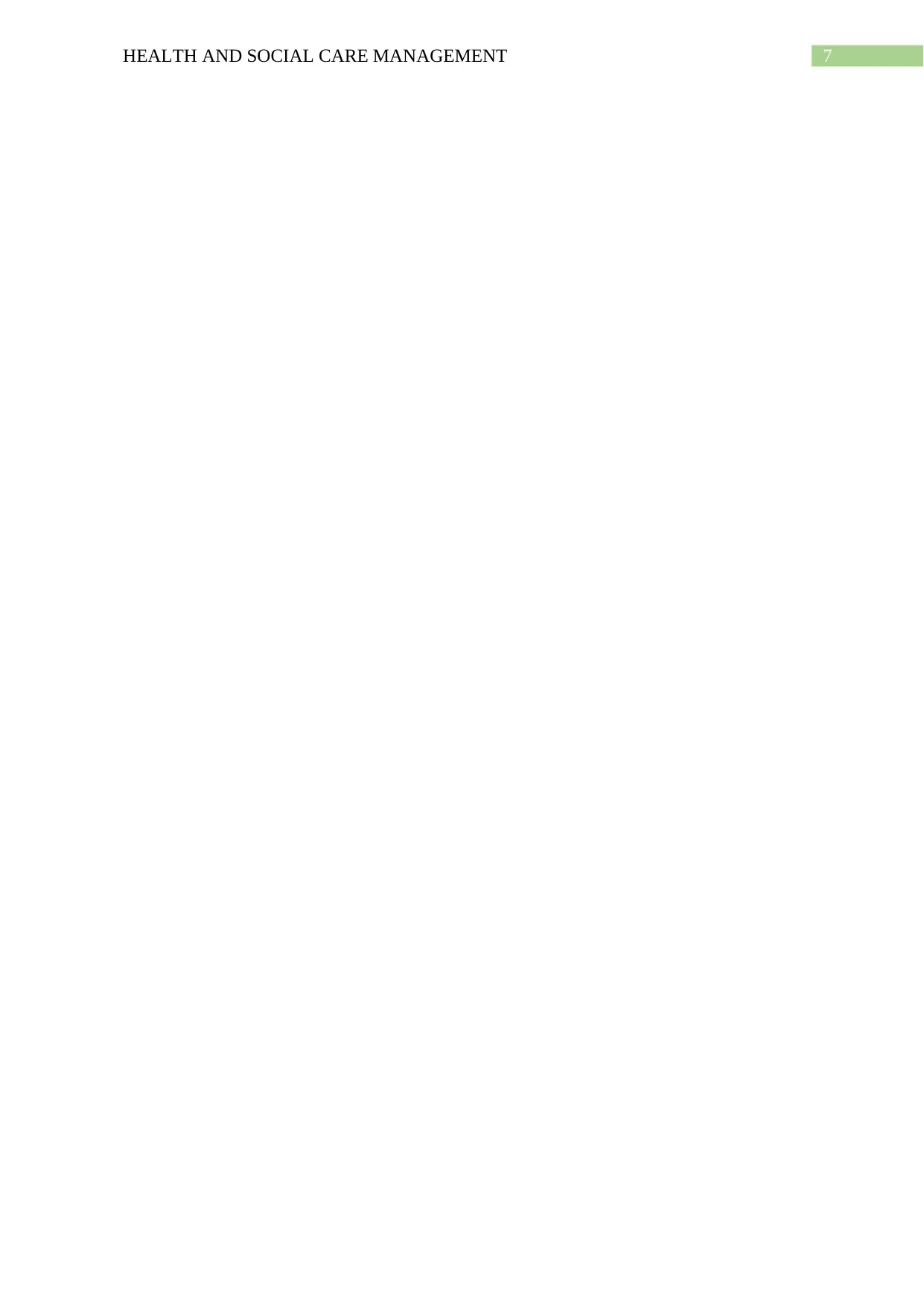
7HEALTH AND SOCIAL CARE MANAGEMENT
1 out of 8
Related Documents
Your All-in-One AI-Powered Toolkit for Academic Success.
+13062052269
info@desklib.com
Available 24*7 on WhatsApp / Email
![[object Object]](/_next/static/media/star-bottom.7253800d.svg)
Unlock your academic potential
Copyright © 2020–2026 A2Z Services. All Rights Reserved. Developed and managed by ZUCOL.



